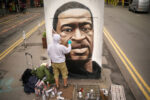 We are all aware of the events that have taken place in cities and communities across the United States since the death of George Perry Floyd, Jr., on May 25, after a Minneapolis police officer had his knee on Floyd’s neck for eight minutes and 46 seconds, and two minutes and 53 seconds after Floyd was unresponsive. It has brought back vivid images of violence committed against African Americans and revealed once again that racism is indeed “America’s original sin.” We have witnessed the peaceful protests that have occurred in many places, including Charlotte and Clover. We saw the few early instances when the protests turned violent. And in today’s world, as social media shares videos of these events, we quickly draw conclusions and make statements that are not always helpful in resolving these frightful occurrences.
We are all aware of the events that have taken place in cities and communities across the United States since the death of George Perry Floyd, Jr., on May 25, after a Minneapolis police officer had his knee on Floyd’s neck for eight minutes and 46 seconds, and two minutes and 53 seconds after Floyd was unresponsive. It has brought back vivid images of violence committed against African Americans and revealed once again that racism is indeed “America’s original sin.” We have witnessed the peaceful protests that have occurred in many places, including Charlotte and Clover. We saw the few early instances when the protests turned violent. And in today’s world, as social media shares videos of these events, we quickly draw conclusions and make statements that are not always helpful in resolving these frightful occurrences.
There have been many calls for prayer, and on Monday, I joined clergy and laity from across the United States in a Zoom prayer service sponsored by the International Council of Community Churches. It is my prayer that together we would act in such a way as to embrace Jesus’s teaching: “Blessed are the merciful, for they will be shown mercy; blessed are the peacemakers, for they shall be called children of God.” To be a peacemaker at this moment will require persistent efforts to change the status quo, to speak truth to power, and to empathize with and embrace our sisters and brothers of the African American community. It will require deliberate and measured steps to build a new level of trust and understanding which have not always been earned or deserved by white Americans when one considers all that African Americans throughout history have had to endure.
I have been a pastor now for 35 years, and if I have learned anything, it is this: The way in which we live in community with others is a spiritual issue. The way in which we treat others is a spiritual issue. The way in which we respond to others is a spiritual issue. When Jesus asked the question, “Who is my neighbor?” he told a story of violence and concluded with a question of his own, “Which of these was a neighbor to the one who fell into violence?” (in the parable of the Good Samaritan). The answer was clear: it was the one who risked helping the one who had been beaten and attacked.
 The prophet Hosea (10:12) called upon God’s faithful people to live in a different way by saying, “Sow righteousness and justice, and reap of the fruit of unfailing love. It’s time to prepare new ground, for it is time to seek the Lord.” This is such a time. May we learn to live in this different way. I know this: we cannot honestly say all lives matter until black lives matter.
The prophet Hosea (10:12) called upon God’s faithful people to live in a different way by saying, “Sow righteousness and justice, and reap of the fruit of unfailing love. It’s time to prepare new ground, for it is time to seek the Lord.” This is such a time. May we learn to live in this different way. I know this: we cannot honestly say all lives matter until black lives matter.

